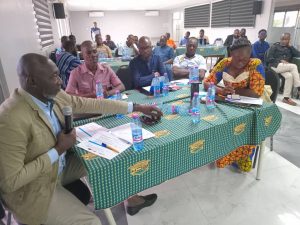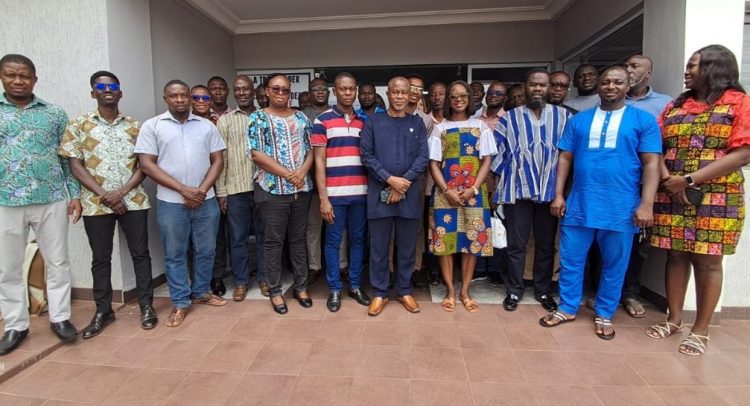A group photograph with the participants
A Peace and Governance Analyst with the United Nations Development Programme, Melody Azinim has called for effective collaborations and information sharing by Civil Society Organizations and other development organizations that are working to prevent or respond to violent extremism in Ghana.
“Many development organizations are doing the same or similar activities in the same space, and because most often organizations work all by themselves, we end up spending resources and time on our individual projects and we end up duplicating activities and projects. This is not good for development, considering the fact that resources are limited and yet, there is so much to be done.”
Melody Azinim spoke in an interview with the Daily Guide in Bolgatanga at a two-day stakeholders’ engagement on learning and knowledge sharing for effective coordination and implementation. The workshop was organized by the United Nations Development Programme (UNDP) under its Preventing and Responding to Violent Extremism in the Atlantic Corridor project.
The UNDP is implementing a 3-year project dubbed, Preventing and Responding to Violent Extremism in the Atlantic Corridor, and as part of measures to ensure sustainability and effective use of resources and time, brought together selected stakeholders – Non-Governmental Organizations that are working on peace and violent extremism prevention projects, District Planning Officers and Coordinators, as well as officers of the National Peace Council working in the five regions in Northern Ghana, to learn and share knowledge on best practices and pit-holes that could hinder effective implementation of the project in the beneficiary areas in Ghana.
The project is co-funded by Australia, Germany, Denmark and Norway.

Melody Azinim said: “We wanted to know what other organizations are doing, how they are implementing best practices, how they are addressing some of the challenges that come up in the course of implementation and even, how gender is mainstreamed into their activities, so that we can align. So, after this engagement session, we will create a common platform for continuous sharing of information and research outcomes.
We (UNDP) would try to reach more Civil Society Organizations that are also working on projects like ours to add them to the platform. If we work together, we can cover more areas. There are NGOs that have conducted researches and have great outcomes and recommendations. In many cases these NGOs are not able to implement all the recommendations alone. Once this information is shared other organizations can take up other recommendations and implement for a meaningful impact on the ground and for the good of society.”
According to her, there have been situations where projects have stalled or not sustained because some state actors in public offices did not play their expected roles due to lack of commitment or knowledge about a development project, adding that, “… we need to involve the offices or units in our plannings and implementations. Usually, when you limit the involvement to individuals, the project or programme suffers in his or her absence, but the office or unit will always be there. All we need for continuity and sustainability is the documentations.”
Representatives of organizations such as WANEP-Ghana, COGINTA, Catholic Relief Service, Trust to Peace under the USAID, the International Organization on Migration (IOM) and GIZ shared best practices and experiences, as well as challenges encountered in their implementations, and also exhibited their willingness to collaborate to work with other organizations working on similar projects for effective implementation and use of resources.
The UNDP is supporting the National Peace Council to implement some of its activities across Ghana. Ali Anankpieng is the Regional Executive Secretary of the Upper East Regional Peace Council.
According to him, the Peace Councils are key stakeholders in the UNDP’s Preventing and Responding to Violent Extremism project and even prior to this project, there had been trainings and capacity buildings various officers of the council and well as other partners including security services, community leaders, the media and others who have roles to play to either prevent or respond to issues relating to violent extremism.
“One thing that easily spark conflict and violence is hate speech. The Upper East Regional Peace Council with support from the UNDP has been holding community durbars in some selected districts on the effect of hate speech on community development. We are still holding these meetings and the council is very hopeful that very soon people will appreciate the effect and desist from hate speech and propagating same.
We have, and we are still training some key personalities on how to detect and identify early warning signs of violent extremism in their communities. We only pray that the UNDP continues to support the Regional Peace Council to do more to ensure a peaceful Ghana.”


